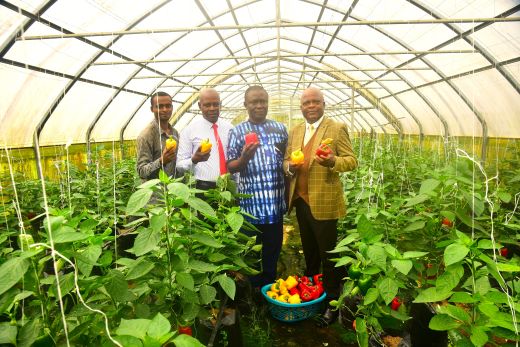The Federal University of Technology, Akure (FUTA) is expanding its production of F1 bell peppers in response to growing national demand and the crop’s superior nutritional and health benefits. The university plans to increase its greenhouse facilities from one to six by year-end, as it positions itself for large-scale distribution and potential exportation.
Receiving the freshly harvested peppers from the University’s Vegetable Production Centre, Vice Chancellor Professor Adenike Oladiji expressed excitement over the progress and reaffirmed FUTA’s commitment to food security.
“We are not paying lip service to food security,” she said. “FUTA is expanding this initiative, not only to meet demand but also to provide hands-on training for those interested in greenhouse cultivation. We’re ready to collaborate with governments and organizations to make this nutritious produce widely available and affordable.”
She emphasized the commercial potential of the project, noting that “The market is waiting for us. We already have an increasing demand across the country. With time, we aim to take this product global through exportation.”
Professor Ayoola Olalusi, who leads the project from the Department of Agricultural Engineering, presented the new harvest to the Vice Chancellor, revealing that demand is especially high in Lagos and Ibadan, where vendors often pre-book the product ahead of harvest.
“The expansion to six greenhouses gives us the confidence to meet market expectations. Our bell peppers—green, yellow, and red—are already setting a standard,” he said.
The F1 bell pepper is a hybrid variety distinguished by early ripening, strong disease resistance, a bushy structure that doesn’t require staking, and large fruit size—measuring about 10-11 cm in width and 11-12 cm in length, with a typical weight of 250-280 grams.
Professor Olalusi added that the variety is uniquely suited to greenhouse cultivation and that FUTA is open to guiding farmers and agribusinesses interested in adopting this method, either at a smallholder or commercial scale.
“This can evolve into a major revenue stream for FUTA and its partners,” he said.
Beyond aesthetics and taste, bell peppers are a highly nutritious food. A 100-gram serving delivers over 150% of the recommended daily intake of vitamin C, alongside vitamins A, B6, E, K1, and minerals such as potassium, magnesium, and iron—with just 31 kilocalories per serving.
As FUTA’s initiative continues to thrive, the university is seeking partnerships with private firms, government agencies, and development stakeholders to scale up production, supporting both local consumption and international trade opportunities shortly.


